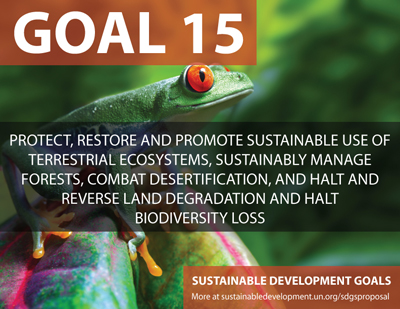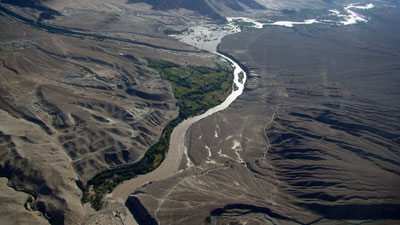|
Working Group discussing Goal 15 “Protect, restore and promote sustainable use of terrestrial ecosystems, sustainably manage forests, combat desertification, and half and reverse land degradation and halt biodiversity loss”

Terrestrial ecosystems and resources are being over exploited posing serious threat of environmental degradation and unsustainabity. The Sustainable Development Goal 15 tries to address to these issues and this workshop will look at the convenient ways for strengthening SD Goal 15.
The implications of our use of forests, land and water have become over the last 30 years clearer and also apparently more intractable. From the point of view of focused and mindful study, whether this is done as a holder of traditional or indigenous knowledge, or as a part of a formal science stream, there is a paradox about what we see and more recently what we measure.
This is that although with every season there is new evidence available for governing with much more rigour our natural resources, the ecological governance required to do so appears to be either missing or is inadequate to halt the trend of continuing degradation. We are able to recognise, to a much finer degree than was possible a generation ago, the limits to which what is called natural capital can be used, or exploited.
We also recognise, as has done every generation before us, that these resources are the basis for our civilisations. Yet the impulse to address problems concerning their use and problems concerning their management (or stewardship) is to be found today mainly in interested sections of society (such as government and administration, scientists, tribal societies and indigenous communities, bearers of intangible cultural heritage) but scarcely in society as a unit.
The difference between these two states of recognition can be attributed to the lack of education - in all its forms and methods. It is this gap, as it exists today and as we forecast will continue to exist for at least another generation, which we are addressing through the agency of education for sustainable development.
In our discussions and recommendations we would like to consider how cumulative consumption is reducing the basis of productive capital (plant biomass, surface and ground water, soil) because of our activities that are based on the arability of energy (non-renewable mainly) which have led society to treat natural capital as inexhaustible - of course it is not, and its abundance depends entirely on our ability to recognise limits and uphold responsibilities. Not doing so has resulted in the unsustainability, in several simultaneous dimensions, of our civilisation and the emergence of new hazards.
 Over the six Working Group sessions spread over a total duration of 11 hours we propose to:
Over the six Working Group sessions spread over a total duration of 11 hours we propose to:
* Consider representative types of our terrestrial ecosystem and resources (regional, national and sub-national) not for the purpose of scientific reference but as the focus of methods determined by the practice of education for sustainable development
* Discuss the transmission systems of human activity which have local impact: cultural, economic, trade and travel networks. Examine with examples how these transmissions have degraded ecology in ways that deepen poverty, inequality and conflict
* Explore the ways in which communities are confronted by inter-related environmental, socio-economic, political and cultural problems that must be understood as parts of a whole in providing guidance for the way in which each can be effectively addressed
* Acknowledge different streams of knowledge (common local and cultural local which has been carried through folklore, expression, proverbs and epics; that which is based upon faith and spirituality; learnings from science both indigenous and formalised) and their roles in the development of culturally responsive and sustainable approaches to education for sustainable development
* Guide the framing of necessary social transitions, with education for sustainable development being a central agency, which rest upon values and beliefs that underpin behaviour, social practices and lifestyles that are respectful of natural limits and flows and which recognise shared responsibilities
This will lead us to outcomes such as:
* Outlining pedagogical approaches (in non-formal, formal, household and community education spaces and institutions) which employ values and culture in order to de-couple the well-being of communities from the over-exploitation of terrestrial ecosystem and resources
* Facilitating citizen engagement and participation to create communities of practice where the action-reflection approach enables experiential learning as a precursor to transformative and durable social change
* Disengaging the processes of mitigation and adaptation from the domain of science and administration and introducing them into the perspectives and practices especially of the youth (and youth-led organisations)
We expect our Working Group sessions, outcomes and recommendations to contribute to the overall objective of the Ahmedabad conference to bring together regional and global experience and expertise of employing education as a means of achieving the sustainable development goals and elaborating the India experience in doing so.

